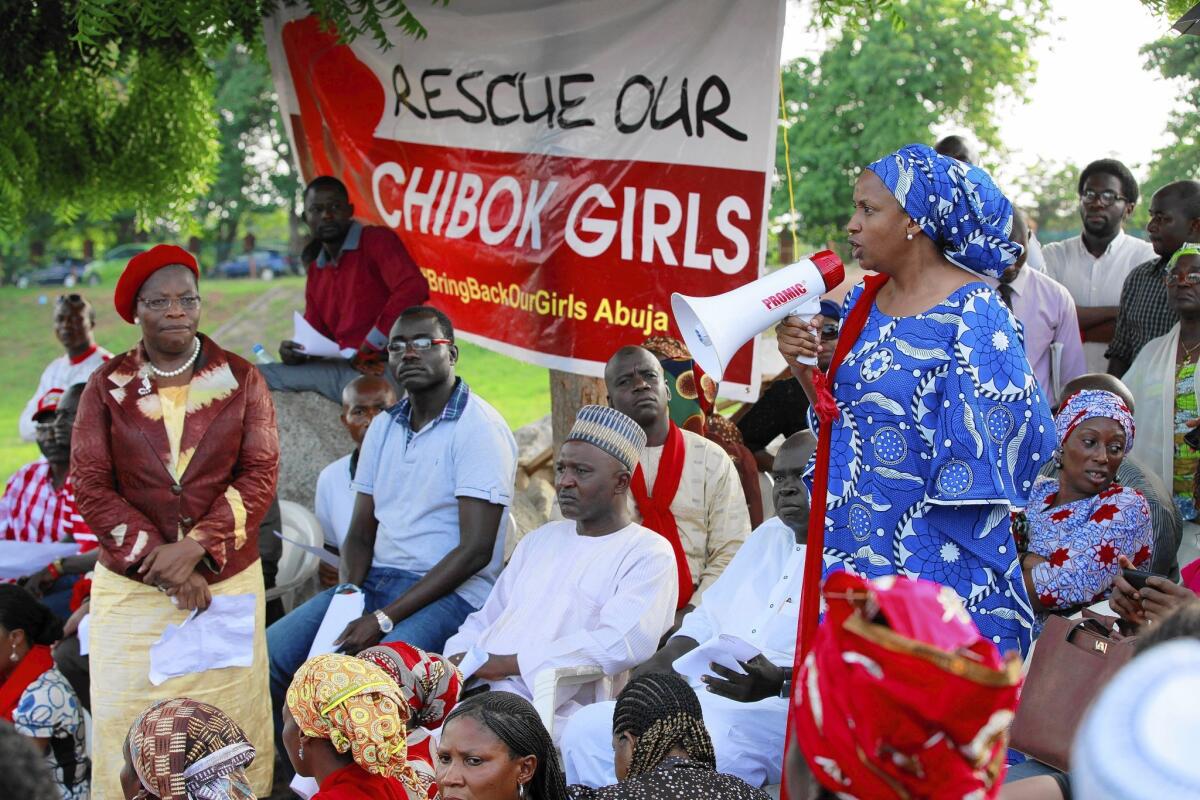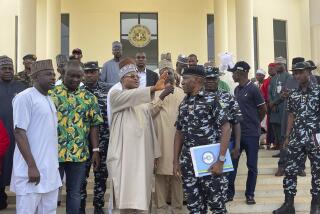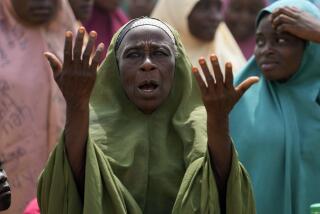Fear and determination for Nigerians at heart of #BringBackOurGirls

- Share via
Reporting from Abuja, Nigeria — Each day the relatives, friends and activists gather in a park below a towering luxury hotel here in the Nigerian capital to plan the next step in their effort to bring back 276 abducted girls.
On Wednesday, the #BringBackOurGirls international social media campaign marked Day 37. On Thursday, key members plan to march to the office and residence of President Goodluck Jonathan, known here as the Villa, in the hope of meeting with him.
Perhaps 100 people form the nucleus of the wildly successful campaign, which has pressured the government and security forces to do more to rescue the schoolchildren and has focused global attention on the decade-old violent insurgency.
The atmosphere in the park is something between a town hall meeting and a charismatic congregation, fueled by faith, enthusiasm and determination. Faces glow in the wilting afternoon heat as the group discusses T-shirts and banners for the march. The feisty, imposing women at the heart of the effort urge everyone to wear red shirts, and they discourage scrawling slogans willy-nilly on homemade banners.
Oby Ezekwesili, a coordinator, begins the meeting most days, saying in her deep voice, “What do we want?”
“Bring back our girls, now and alive,” the chorus returns.
“OK, wake up!” she exhorted at Tuesday’s meeting. “Why are we here?” The crowd shouted back, louder this time. But it wasn’t enough for Ezekwesili, clad in a pink outfit with a pert red beret. “That’s not sharp,” she said.
“Is anyone tiring out?” she said.
The crowd shouted, “No!”
“Are you ready to be said to have given up?”
“No!”
There was singing. There were prayers. There were calls to donate money for the T-shirts bearing the slogan #BringBackOurGirls. Members of the crowd grabbed a microphone to offer suggestions, comments and news.
But for all its global visibility, the #BringBackOurGirls activism hasn’t led to the recovery of the children, who were abducted from a boarding school outside Chibok in northeastern Nigeria on April 14, then whisked away in trucks and buses in the dead of night.
The White House said Wednesday that it would send about 80 military personnel and several surveillance drones to neighboring Chad to help in the search. That force is in addition to about 30 military, intelligence and law enforcement advisors sent to Nigeria.
“These personnel will support the operation of intelligence, surveillance and reconnaissance aircraft for missions over northern Nigeria and the surrounding area,” President Obama said in a notification required under the War Powers Act. “The force will remain in Chad until its support in resolving the kidnapping situation is no longer required.”
The girls’ kidnappers, the militia known as Boko Haram, which seeks to establish an Islamist state, has threatened to sell them as slaves. A video released by the militants showed the girls in a large group, wearing Islamic dress and chanting Koranic verses. Boko Haram, whose name translates as “Western education is a sin,” opposes secular education.
Uncles and cousins of the girls come to the meeting daily, expressing hope tempered by fear. They know that gaining the girls’ release is an almost impossibly delicate prospect. But even those who have opposed bartering with terrorists find that in this case, they prefer a negotiated solution. Except for government ministers, that is, who have ruled out dialogue.
“My own personal opinion is you don’t negotiate with terrorists. But if you go with military force, there’s a danger to the children,” Yakuba Iliya Ndirpaya said at Tuesday’s gathering. His 16-year-old niece was among the abducted, but she escaped by grabbing a tree as the truck she was traveling in passed under it. She dropped to the ground and fled into the forest, eventually coming upon villagers.
Ndirpaya, a businessman originally from Chibok, now lives in Abuja.
“The security forces come out and say they’re doing their best. Your best is not your best when the girls are not found,” he said.
Activist Shehu Sani, who conducted negotiations with Boko Haram in 2011 and 2012, said in an interview Wednesday that the government was trying to negotiate in secret.
“Publicly they make announcements that they will not negotiate, but they are trying to work out the possibility of talking to them through some sources,” Sani said. “But if the government negotiates, it will be seen as weak and surrendering to terrorists. If they don’t, they will be blamed for whatever the consequences are, if it’s the death of the girls. That is why you see conflicting signals from the government on whether to dialogue or not to dialogue.”
Sani said Boko Haram representatives don’t trust the government to keep its word on any deal.
Tsmabido Obana counts five relatives, age 16 to 18, among the missing girls.
“I’m beginning to lose hope,” he said at Tuesday’s gathering. “The problem is how to take them from under the insurgents’ hand. The insurgents are using the girls as a shield around them.”
Obana said he didn’t think that any of the girls, who are Christian, had been converted to Islam by their captors, despite the video that showed them chanting Koranic verses while wearing the Islamic covering known as the hijab.
“A hijab is just a cloth,” he said. “You can remove it at any time.”
Another uncle of five abducted girls, Pudza Habila, was discouraged and angry.
“Nobody knows what is happening to these girls right now,” he said. “There’s nothing we can do.”
Local media citied unnamed Nigerian military sources Wednesday as saying they had located three Boko Haram camps where the girls were being held.
“Knowing where the camps are is one thing,” said Pogu Bitrus, leader of the Chibok Elders Forum. “Being able to rescue the girls alive is another.”
Violence continues daily in northeastern Nigeria, with 27 people reported killed in recent attacks on two villages near Chibok.
An attack Monday night on the village of Shawa left 10 people dead, according to authorities. In an attack Tuesday on Algarno, about 17 people were killed.
Representatives of the #BringBackOurGirls campaign also reported an attack on Chibok on Tuesday, but it had not been confirmed.
More to Read
Sign up for Essential California
The most important California stories and recommendations in your inbox every morning.
You may occasionally receive promotional content from the Los Angeles Times.










